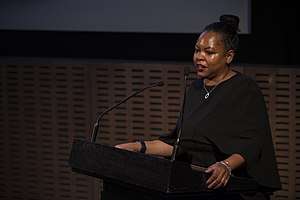Simone Browne
Simone Arlene Browne (born 1973) is an author and educator. She is on the faculty at the University of Texas at Austin,[1] and the author of Dark Matters: On the Surveillance of Blackness.

Early life and education
Browne was born in 1973,[2] and grew up in Toronto, Ontario, where she received a BA (with honors), MA, and PhD at the Ontario Institute for Studies in Education in the Department of Sociology and Equity Studies at the University of Toronto.[3] Her 2001 Masters thesis was titled, Surveilling the Jamaican body, leisure imperialism, immigration and the Canadian imagination.[2] Her doctoral dissertation in 2007 was titled, Trusted travellers: the identity-industrial complex, race and Canada's permanent resident card.[4]
Career
Browne is a Professor of Black Studies in the Department of African and African Diaspora Studies at the University of Texas at Austin.[1] Her most recent book, Dark Matters: On the Surveillance of Blackness, published by Duke University Press in 2015, presents a case to consider race and blackness as a central to the field of surveillance studies, and investigates the roots of present-day surveillance in practices originating in slavery and the Jim Crow era.[5][6] Javier Arbona of the University of California, Davis, said "her wholly original scholarship best captures new kinds of thinking and theorizing in surveillance studies".[7]
She is a member of Deep Lab, a "congress of cyber-feminist researchers."[8]
She is also on the executive board of HASTAC, a virtual organization led by a dynamic Steering Committee consisting of innovators from a variety of disciplines.[9]
Her upcoming work will involve the curation of an exhibit about surveillance through black women artists at the University of Texas at Austin.[10]
Awards
- Winner of the 2016 Best Book Prize, Surveillance Studies Network[11]
- Winner of the 2016 Lora Romero First Book Prize, American Studies Association[12]
- Winner of the 2015 Donald McGannon Award for Social and Ethical Relevance in Communications Technology Research[1]
References
- "UT College of Liberal Arts". liberalarts.utexas.edu. Retrieved 2018-04-13.
- Brwone, Simone Arlene (2001). "Surveilling the Jamaican body : leisure imperialism, immigration and the Canadian imagination". library.utoronto.ca. Retrieved 2018-04-14.
- "5 Questions: Dr. Simone Browne, Associate Professor, African and African Diaspora Studies". AMS :: ATX. 2016-01-28. Retrieved 2018-04-14.
- Browne, Simone Arlene. "Trusted travellers : the identity-industrial complex, race and Canada's permanent resident card". search.library.utoronto.ca. Retrieved 2018-04-14.
- Lingel, Jessica (2016-04-22). "Review of Dark Matters: On the Surveillance of Blackness by Simone Browne (Duke University Press, 2015)". Catalyst: Feminism, Theory, Technoscience. 2 (2): 1–5. doi:10.28968/cftt.v2i2.28806. ISSN 2380-3312.
- McGlotten, Shaka (2017-01-01). "Dark Matters: On the Surveillance of Blackness by Simone Browne". American Journal of Sociology. 122 (4): 1305–1307. doi:10.1086/689272. ISSN 0002-9602.
- "Humanities Institute » Simone Browne Explores Surveillance through the History of Slavery". dhi.ucdavis.edu. Retrieved 2018-04-16.
- "exploring feminist hacktivism with deep lab". I-d. 2015-07-20. Retrieved 2018-04-14.
- "Leadership". HASTAC. Retrieved 2020-06-10.
- S, Nyeda (2019-03-31). "Interview with Simone Browne". Medium. Retrieved 2020-06-10.
- "Vol 15 No 1 (2017): Race, Communities and Informers, Surveillance & Society". ojs.library.queensu.ca. Retrieved 2018-04-17.
- "Lora Romero Prize | ASA". www.theasa.net. Retrieved 2018-04-17.
External links
- Simone Browne, Dark Surveillance: Race, Surveillance and Resistance (Video, 1:04:05)
- Simone Browne: Surveillance in Color (Ep. 125) (Podcast, 20:44)
- Smile, Your'e on Camera: Behind the Lens of 24/7 Surveillance
- Tracking Blackness: a Q&A with Dark Matters Author Simone Browne
- Biocode Mixes Art and Academia to Explore Pigeonholing
- What UC-Berkeley Freshmen are Reading this Summer
- Tactics of Appearance
- 2019 Art+Feminism Wikipedia Edit-a-thon panel (video, 55:04; begins at 9:53)